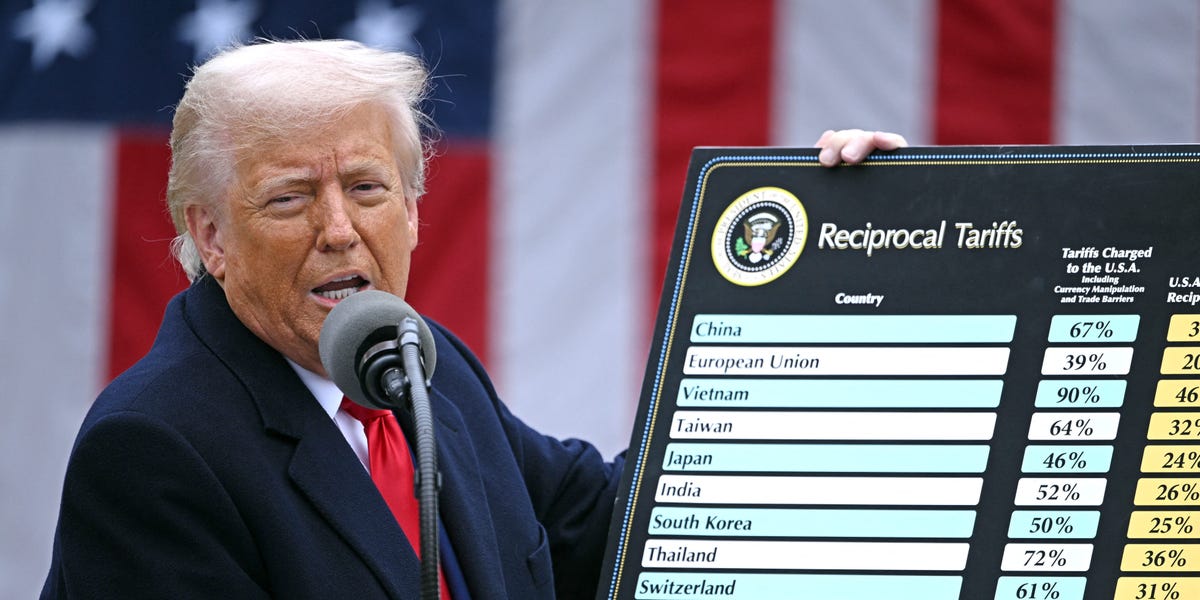In a shocking move, President Trump has announced a new set of tariffs that will have far-reaching consequences for the global economy. Today, we’ll take a closer look at who will be most impacted by these tariffs and what the implications are for businesses across the globe.
Impact of Trump’s ‘Liberation Day’ Tariffs

The recent announcement by President Donald Trump of a reciprocal tariff scheme and a 10% baseline tariff on all countries has sent shockwaves through the global economy. The move is expected to increase prices on a range of goods that Americans rely on, including cars, agricultural products, and electronics.
The tariffs will primarily target countries with the highest trade deficit with the US, including China, Vietnam, and Cambodia. Under the reciprocal tariff scheme, countries will be charged approximately half of what they have been charging the US. This means that the total effective tariff rate on Chinese goods now stands at 54%, with a 34% reciprocal tariff on top of the existing 20% tariff.
The impact of these tariffs will be felt across various industries, with some companies expected to absorb the costs, while consumers will bear the brunt of increased prices. The automotive industry, in particular, is likely to be affected, with the US tariffs on car imports expected to increase prices for consumers and potentially lead to job losses in the sector.

Trade Deficits and Associated Countries
The tariffs will target countries with the highest trade deficit with the US, including:
- China: With a trade deficit of over $375 billion, China will be hit hardest by the tariffs, with a total effective tariff rate of 54%.
- Vietnam: Vietnam’s trade deficit with the US is over $44 billion, and the country will face a 46% tariff under the reciprocal scheme.
- Cambodia: Cambodia’s trade deficit with the US is over $3 billion, and the country will face a 49% tariff under the reciprocal scheme.
Global Markets and Economic Impact
The announcement sent global markets plummeting, with investors anticipating increased uncertainty and potential costs for affected companies. The tariffs are expected to lead to increased prices for consumers, particularly for goods such as cars and agricultural products.
The impact on global markets will be far-reaching, with countries such as Canada and Mexico likely to take countermeasures against the US tariffs. The European Union has already condemned the move, with European Commission President Ursula von der Leyen stating that tariffs “make things work worse, not better.”
Canada and Mexico’s Potential Retaliatory Measures
Canada and Mexico have vowed to take countermeasures against the US tariffs, but details are still unclear. The impact on trade between these countries could lead to increased tensions and economic instability.
The US is likely to suffer retaliatory tariffs following Trump’s announcement. The leaders of multiple countries, including Canada and China, have vowed they would be taking countermeasures but did not immediately provide details on what that would look like.
Impact of Tariffs on Specific Industries
Automotive Industry and Car Imports
The US tariffs on car imports will increase prices for consumers and potentially lead to job losses in the automotive sector. The tariffs are expected to affect companies such as General Motors, Ford, and Toyota, which import cars from countries such as Mexico and China.
The impact on the automotive industry will be significant, with some companies expected to absorb the costs, while others may pass them on to consumers. The tariffs are likely to lead to increased prices for consumers, potentially affecting the demand for cars and the overall health of the industry.
The United Auto Workers union has previously lauded the president’s plan to place a 25% tariff on all cars and car parts imported into the US, saying it would bring more jobs back into the US auto industry.
- General Motors: With a significant presence in the US market, General Motors is likely to be affected by the tariffs, with potential increases in prices for consumers.
- Ford: Ford is another major player in the US market, and the tariffs are expected to impact the company’s operations and pricing.
- Toyota: Toyota imports cars from countries such as Mexico and China, making it vulnerable to the tariffs.
Global Markets and Economic Impact
Increased Prices and Consumer Impact
The tariffs are expected to lead to increased prices for consumers, particularly for goods such as cars and agricultural products. While some companies may absorb the costs, consumers will bear the brunt of the increased prices.
The impact on global markets will be far-reaching, with countries such as Canada and Mexico likely to take countermeasures against the US tariffs. The European Union has already condemned the move, with European Commission President Ursula von der Leyen stating that tariffs “make things work worse, not better.”
Investors are likely to be cautious in the face of increased uncertainty and potential costs for affected companies. The tariffs are expected to lead to increased volatility in global markets, making it a challenging time for investors.
- Stock Market: The tariffs are expected to lead to increased volatility in the stock market, making it a challenging time for investors.
- Commodity Prices: The tariffs are expected to lead to increased prices for commodities such as oil and agricultural products.
- Currency Markets: The tariffs are expected to lead to increased volatility in currency markets, making it a challenging time for currency traders.
The United Auto Workers Union Supports Tariffs
The United Auto Workers union has expressed support for the tariffs, citing the need to bring jobs back to the US. The union believes that the tariffs will help to revitalize the US auto industry and create more job opportunities for American workers.
Agricultural Sector and Food Prices
Potential Impact on Food Prices
The tariffs on agricultural goods could lead to increased prices for food and other products, affecting consumers and the broader economy. Some farmers may choose to absorb the costs, while others may pass them on to consumers.
This could result in higher prices for goods such as meat, dairy products, and fruits and vegetables. Consumers may need to adjust their budgets to accommodate these increased costs, which could have a ripple effect on the entire economy.
Steel and Aluminum Imports
25% Charge on Steel and Aluminum
The 25% charge on steel and aluminum imports is already in effect and is expected to have significant economic implications. This tariff is likely to increase the cost of goods such as cars, appliances, and construction materials, which could lead to higher prices for consumers.
Companies that rely heavily on steel and aluminum imports may need to absorb these increased costs, which could affect their profitability and competitiveness in the market.
Reaction from Countries and Industries
Leaders and Governments
The leaders of multiple countries, including Canada and China, have vowed to take countermeasures against the US tariffs. The European Union has also expressed concerns about the impact of the tariffs, with President Ursula von der Leyen stating that tariffs “make things work worse, not better.”
These countries may impose retaliatory tariffs on US goods, which could lead to a trade war and have significant implications for global trade and economic growth.
Business and Industry Associations
United Auto Workers Union Supports Tariffs
The United Auto Workers union has expressed support for the tariffs, citing the potential to bring more jobs back to the US auto industry. However, other business groups may be more critical of the move, citing concerns about the impact on trade and economic growth.
The impact on trade and economic growth will likely be felt across various industries and sectors, and will be closely watched in the coming weeks and months.
Consumer Impact and Financial Strains
Increased Financial Strains
The ongoing uncertainty and potential costs of the tariffs will likely lead to increased financial strains for consumers and businesses. Consumers may need to adjust their budgets to accommodate higher prices, while businesses may need to absorb increased costs or pass them on to consumers.
The impact on global markets and economic growth will be closely watched in the coming weeks and months, as the effects of the tariffs begin to take hold.
Conclusion
As the article “Here’s Who’s Getting Hit Hardest by Trump’s ‘Liberation Day’ Tariffs – Business Insider” reveals, the recent imposition of tariffs by the Trump administration has far-reaching consequences for various sectors of the US economy. The key points highlighted in the article include the devastating impact on US farmers, particularly those who rely heavily on imported aluminum and steel, as well as the crippling effects on manufacturing and consumer goods. Furthermore, the article showcases how these tariffs, intended to protect US industries, inadvertently harm the very same domestic producers and workers they aim to shield.
The significance of this topic lies in its far-reaching implications for the US economy and global trade. The tariffs imposed by the Trump administration have sparked a trade war, with other countries retaliating with their own tariffs, further exacerbating the economic uncertainty. As the article argues, the unintended consequences of these tariffs threaten to upend the domestic economy, with far-reaching repercussions for businesses, workers, and consumers alike. As the trade landscape continues to evolve, it is essential for policymakers and business leaders to reevaluate their strategies and prioritize a more balanced approach to trade.
In the face of this economic uncertainty, it is imperative that policymakers and business leaders take a proactive stance to mitigate the damage caused by these tariffs. By prioritizing diplomatic efforts and fostering cooperation with international partners, the US can work towards a more stable and equitable trade framework. As we move forward, it is clear that the consequences of these tariffs will be felt for years to come, and it is up to us to navigate this complex economic landscape and find a path towards a more prosperous future. The question remains: can we find a way to balance economic protection with global cooperation, or will the ‘Liberation Day’ tariffs be remembered as a costly mistake that will take years to recover from?
